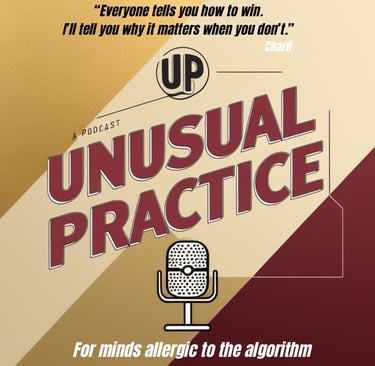
Is It Still Smart to Believe in Humanity? Or Are You Just Being Naive?
In an age of cynicism, digital disconnection, and global chaos, is it still possible to believe in humanity without sounding delusional? Let’s discuss why hope isn’t naive but rather a radical, intelligent act of defiance. Explore the science, the sociology, and the quiet proof that kindness still exists - and why choosing belief in people may be the smartest thing you ever do!
Charli | Cultural Disruptor | For UP podcast
6/23/20254 min read
Let’s be honest: saying “I believe in people” today feels about as edgy as wearing a “Live, Laugh, Love” t-shirt to a philosophy conference!
Somewhere along the way, hope got a bad reputation. Optimism became the emotional equivalent of unicorns - cute, outdated, and likely to get laughed out of the room.
We’ve been taught that cynicism equals intelligence, that being skeptical is the mark of someone who gets it.
Believe in humanity? That must mean you also believe in the tooth fairy and politicians!
But what if we’ve got it completely backwards?
🤯 Hope Isn’t Naive, It’s Neurologically Efficient
Studies show that optimists live longer, are healthier, and build stronger social bonds. Turns out, people who expect decency are less stressed, less isolated, and more mentally flexible. So who’s the fool? The one trusting others, or the one doom-scrolling into chronic inflammation? Wish I understood that before, but hey-ho!
Maya Angelou said it best: "A wise woman wishes to be no one's enemy; a wise woman refuses to be anyone's victim.” Hope isn’t weakness. It’s a weapon. Especially now.
🚫 Believing in Humanity Doesn’t Mean Ignoring Reality
To be clear: optimism isn’t delusion. Real hope isn’t sugar-coated. It’s street-smart.
Believing in humanity today means choosing trust with your eyes open. It’s like being a nightclub bouncer, you know some people will cause chaos, but you also know most are just trying to get through the night without drama.
Cultures like Sweden get this. Their concept of lagom : “just enough," isn’t about being soft. It’s about balancing boundaries and belief. And countries with high social trust? They consistently report better well-being, stronger institutions, and less collective burnout.
🧱 We Dismantled Meaning, and Then Called Each Other Shallow
Once upon a time, humans shared stories that built cities, cathedrals, and kinship. Today, we share memes and collapse into comment sections. We've replaced communal mythologies with algorithmic dopamine. And then we wonder why trust feels impossible.
Hyper-individualism taught us to worship self-sufficiency, like it’s noble to suffer alone rather than admit we need each other. But the truth is: we always have. The Italians still live this. Your baker knows your name. Your neighbors know your drama. It’s chaotic, but it’s alive.
We’ve traded village squares for curated isolation, and we call that progress?!
🧠 Cynicism Isn’t Smart. It’s Just Easier.
We mistake sarcasm for sophistication because complaining sounds clever. It’s easier to roll your eyes than to roll up your sleeves. But true intelligence? That’s cognitive flexibility. The ability to hold two truths at once: that people can be monstrous and magnificent, sometimes even on the same day!
The happiest countries in the world? Places like Denmark, where “realistic optimism” reigns. They don’t pretend life is perfect. They just decide it’s still worth showing up for.
🫶 The Quiet Proof: Micro-Altruism Still Runs the World
You won't see these stories trending, but they happen every day:
A Korean subway conductor radios ahead to get help for an elderly woman he sees daily.
A homeless man in Birmingham gives tourists directions and tracks regulars’ coffee orders.
A Kenyan teacher funds a breakfast program for her exhausted students, from her own paycheck.
These aren’t feel-good stories. They’re evidence. Proof that human decency is real, widespread, and quietly holding the world together while the rest of us scroll past.
🧨 Right Now, Everything Is Trying to Make You Forget We’re Human
From livestreamed wars to AI replacing empathy, we’re deep into what could be called the Great Dehumanization. Loneliness is a global health crisis. Outrage is monetized. And the deeper we go into virtual connection, the more alienated we feel.
We’ve been trained to perform instead of relate. To “engage” instead of listen. To care in public, but stay numb in private. Believing in humanity now feels risky, because the systems around us profit from suspicion and disconnection.
But every time you risk connection anyway, you're refusing to play that game.
🔥 What We Need Is Radical, Resonant Faith
Not blind optimism. Not positivity porn. Faith with its sleeves rolled up. Faith that admits how messy things are, and believes in us anyway.
The Maori have a word for this: whakatōhea : collective healing through shared action. In South Africa, it’s ubuntu: I am because we are. These aren’t hashtags. They’re cultural technologies that help people remember what makes us human.
We don’t need to believe everyone is good. We just need to remember that goodness is possible, and that we’re responsible for creating the conditions where it can survive.
💡 Believing in People Is the Smartest Rebellion
Belief in humanity isn't some soft fantasy. It’s the ultimate subversion. It’s choosing connection in a system that thrives on division. It’s assuming decency when everything around you says not to. It’s reclaiming meaning in a time of burnout.
Rwandans rebuilt their country after genocide, not because they forgot what people had done, but because they remembered what people could do. They chose to bet on human potential, even when it seemed impossible.
You can too.
So the next time someone says, “Believing in people is naive,” just smile.
Because you know better.
"You know that in a world constantly selling fear, hope is punk. Compassion is a strategy. And choosing belief over bitterness might be the most intelligent thing you can do”.
🎧 Want to go deeper? Listen to Unusual Podcast - Season 2, Episode 10 - “Can You Still Believe in Humanity Without Looking Naive?” Available now on all podcast platforms.
Web link: https://unusualpractice.carrd.co
Spotify link: https://open.spotify.com/show/6NYyT89krj4kseHRZqCahj
Apple Podcast link: https://podcasts.apple.com/us/podcast/unusual-practice/id1783807095
Sponsored by: Lechaos.co


